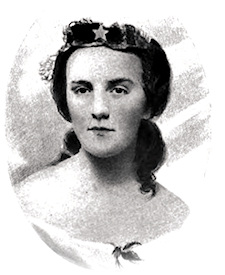The following letter, written from Charleston to the New York Times, gives a very fair account of the surrender of Fort Sumter and my father’s connection with the affair. A Southern newspaper says:
HON. LOUIS T. WIGFALL.
“The gallantry, chivalry, and heroism of this distinguished son of the South is even applauded by those from whom we least expected a word of commendation. The following is an extract of a letter written from Charleston to the New York Times, to which we invite the especial attention of our readers, both on account of its fairness, as well as of its correct representation of the interview which came off between Senator Wigfall and Major Anderson:
” ‘Mr. Wigfall’s exploit was as gallant and chivalrous as any deed of modern times.—Stationed on Morris Island, where he had been on foot or in the saddle since the commencement of the attack, he no sooner saw the second barracks in flames and the flag staff shot away, than he resolved to make his way to the Fort and persuade Major Anderson to desist from a resistance manifestly so unavailing.
” ‘Despite the remonstrances of those around him, he embarked in a skiff, and with three Negro oarsmen and a coxswain, pulled over to the Fort. He was scarce a hundred yards from shore when they hailed to him to return, “The Stars and Stripes were again flying.”—He literally turned a deaf ear to this call, and pushed on, brandishing his sword, to which he had tied his white handkerchief as a flag of truce. From the batteries of Fort Moultrie balls and shell were aimed at the skiff. The white flag was invisible at that distance, and the boat, only noticed when nearing the Fort, if not carrying reinforcements, had no business there. A thirty-two pound ball struck the water within five yards of her, and was followed by a shell which came near proving fatal. The Africans strained every nerve to get under the lee of the fort, and the officers at the batteries observing that the boat never swerved from her course, inferred that Wigfall must have been in it, thereby acknowledging his more than Palmetto recklessness and daring.
” ‘On touching the wharf, the volunteer sprang ashore, and finding the gate burst open by the flames, made his way round to an open port hole on the town side of the fort, through which with the aid of a loose piece of timber which he placed beneath it, he swung himself from a protruding gun into the embrasure. He stumbled unchallenged upon one of the garrison, who did not know where Major Anderson was. The fire was still raging, the heat intense, and the smoke insufferable. Shells were still exploding above, and from time to time within the fort, from the mortars on Sullivan’s Island. He worked his way up to a group of officers and men standing near a casemate—”Was Major Anderson there?” “No!” Before the party had recovered their surprise at the apparition, Major Anderson came up from the quarter Wigfall had just left. He saw the sword and white handkerchief –
” ‘ “Whom have I the honor of addressing?”
” ‘ “Col. Wigfall, of Gen. Beauregard’s staff.”
” ‘ “May I inquire your business with me?”
” ‘ “I have come to say that you must strike your colors. Your position is untenable.—You have defended it gallantly. It’s madness to persevere in useless resistance. You cannot be reinforced. You have no provisions.—Your ammunition is nearly exhausted, and your fort is on fire.”
” ‘ “On what terms do you summon me to surrender?”
” ‘ “Unconditional. Gen. Beauregard is an officer and a gentleman. He will, doubtless, grant you all the honors of war, but speciali gratia.”
” ‘ “Well, I have done all that was possible to defend this fort.”
” ‘ “You have. Haul down your flag.”
” ‘ “But your people are still firing into me.”
” ‘ “Hoist a white one. If you won’t, I will, on my own responsibility.”
” ‘A shell burst in the ground within ten paces of them as they were speaking. Major Anderson invited the Ex-Senator into a casemate; a white flag was hoisted, the firing ceased, and what is called the “battle of Fort Sumter” was over.
” ‘All parties concur that Wigfall’s performance was an act of heroism and high humanity. There can be no doubt that Major Anderson and the garrison were in that state of morbid exaltation which is the forerunner of martyrdom. They were ready to see their magazines explode and “die in their tracks.”
” ‘You know all the details of the capitulation and have, doubtless, done justice to the delicacy and generosity of the rebel general in requiring no parole, besides according all the honors of war to the gallant defenders of Sumter.
” ‘Newspaper correspondents have generally exaggerated the jubilation in this city at the evacuation of Fort Sumter. There were no bonfires, no illuminations, and far less exuberances of conviviality than I have often witnessed during a race week. On the contrary, there were manifestations of thankfulness—of the relief afforded by the removal of a great anxiety.’ “
